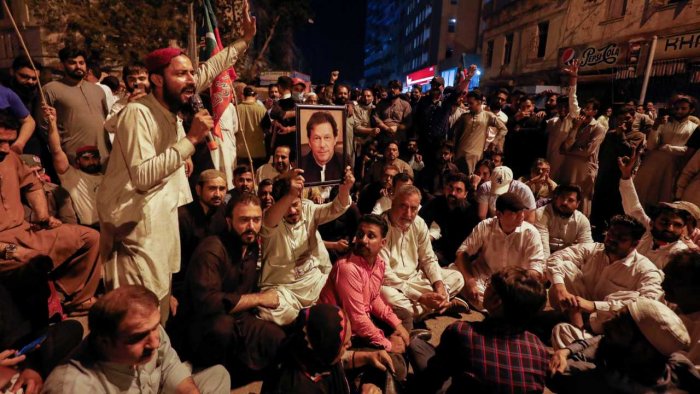Tehreek-e-Insaf, Imran Khan’s party, is under pressure as a result of the government’s threats to repress it. Analysts, however, think that his capacity to amass a sizable following gives him an advantage.
Imran Khan, a former prime minister of Pakistan, is currently being investigated on terrorism-related charges, which has significantly intensified the country’s already tense political situation.
Since Khan’s Pakistan Tehreek-e-Insaf (PTI) party was deposed in April of this year as a result of a no-confidence vote, it has come under intense pressure. The PTI is under pressure because they frequently blame the country’s strong military in their mass rallies, accusing the generals of being behind the regime change, and they back the recently-installed Shehbaz Sharif administration.
Khan’ Aggressive Speech
ImraKhan was charged after he delivered an aggressive speech to tens of thousands of his supporters on Saturday at a rally in the nation’s capital, Islamabad. Khan is a former cricketer who is now a populist politician. He threatened the senior police officers and judge in charge of the case and criticized the arrest of his top aide. Additionally, he claimed that the police had tortured his assistants.
Speaking to his supporters over the weekend, Khan threatened them, saying, “We will file cases against you and will not spare you.”
During his rallies and media appearances, Khan has made remarks that have been directed at Pakistan’s powerful military, police, and current government.
Khan has been given a three-day “transit bail” that prevents police from detaining him on the terrorism-related charges.
Khan’s neighbors gather in front of his home.
On Monday, hundreds of PTI supporters gathered in front of Khan’s hillside home outside of Islamabad to show their support for their leader. If Khan is arrested, PTI has threatened to bring the nation to a standstill through protests and rallies.
A lawyer who was seated close to Khan’s villa entrance warned that if the government detained Imran Khan, there would be a strong, widespread backlash that would bring the nation to anarchy. “We told this administration that their time was up. People will march in their millions toward Islamabad to overthrow this government if you detain our leader Khan.
“People have strong feelings for Khan, and making up accusations against him is absurd. He’s a terrorist, right? No, he is a respected national leader on a global scale. We won’t allow this to take place. Over our dead bodies, they will have to arrest Khan,” added a different supporter.
“Our devoted employees rushed to Khan’s home early on Monday morning and prevented the arrest plan from succeeding. I’ve been here since Sunday night,” said Mohsin Raza, who traveled about 250 kilometers (155 miles) from Islamabad to the Punjabi district of Sargodha.
What’s the basis for Imran Khan’s accusations?
“This government lacks the guts to detain Khan. Because Khan believes that this government will soon be overthrown, the government is censoring Khan’s speeches. As we have seen in Sri Lanka, people will drag them from their homes, said Raza.
Related: Ex-PM Imran Khan arrested outside court in Pakistan
-
A deepening party divide
Analysts attribute the mounting pressure on Khan to the current military hierarchy’s widening gap with Khan’s party.
“The pressure that Khan and his party are currently under won’t last past the tenure of the current military leadership. If PTI survives this particular period of pressure, it will probably emerge much stronger as the country’s undisputed leading party, according to political analyst Mosharraf Zaidi, who spoke to DW.
Khan is skilled at using whatever political pressure he faces to his own advantage, weaving it into his populist narrative that he attracted huge crowds of supporters, according to Elizabeth Threlkeld, director of the South Asia program at the Washington-based think tank the Stimson Center, who spoke to DW. Given Khan’s devoted support base, there is a real risk of backlash should the government exercise excessive pressure against him and his party.
Analysts contend that Khan has an advantage because of widespread popular support throughout the nation, which keeps him at the forefront of Pakistani politics.
According to Madiha Afzal, a fellow at the Brookings Institution, “what Khan currently has that some of his predecessors did not have when they faced a crackdown is the ability to turn out street power.”
The watchdog for Pakistan’s media has forbidden social media from airing Khan’s weekend speech, claiming that he is “spreading hate speech.”
-
Deep and dangerous dissent’ fears
Political analyst Zaidi predicted that the arrest of Khan. He would lead to “deep and potentially dangerous dissent across the country, but particularly in the key urban areas and in northwestern Khyber Pakhtunkhwa.”
“Short-term gains and long-term harm have always been the driving forces behind. The strategies of using the legal system and the judiciary to stifle political expression. No different will apply to this episode. Today’s victims of these strategies will become more powerful politically, said Zaidi.

